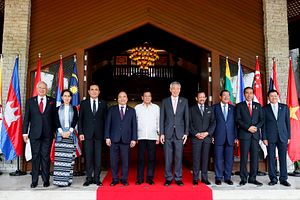ASEAN’s attitude toward the “free and open Indo-Pacific” (FOIP) concept can at present best be described as agnostic. This is understandable since the idea of a free and open Indo-Pacific still awaits a clearer definition. The United States, Japan, India, and Australia do not as yet have a common understanding of the concept or how it will be implemented, beyond their security concerns about China and a desire to present an alternative to China’s Belt and Road Initiative (BRI). This is too narrow a basis to attract wider support. ASEAN members have their own anxieties about China, but at the same time, given China’s economic weight, are wary about anything that smacks of “containment,” particularly at a time when China appears more cooperative about negotiating a code of conduct for the South China Sea.
This was evident at the ASEAN Foreign Ministers retreat held in Singapore from February 4-6, 2018. The FOIP concept was discussed, but in the absence of clarity about what the it really meant, the talks were desultory and inconclusive. Indonesia argued that unless ASEAN came up with its own ideas about FOIP, the new concept could erode ASEAN centrality. Indonesia, however, was unable to clarify its own thinking on FOIP. Indonesia produced a discussion paper overnight, but it provided no greater illumination. The chairman’s press statement made no mention of FOIP.
































